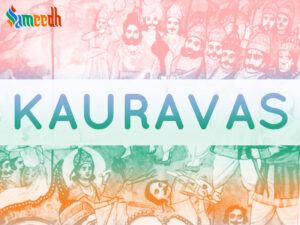The Kauravs are characters from the Indian epic, the Mahabharat. They are the one hundred sons of King Dhritarashtr and Queen Gandhari, born through a process of divine conception. The most prominent among the Kauravs is Duryodhan.

The Kauravs are the primary antagonists in the Mahabharat, and the epic narrates the intense rivalry and conflict between the Kauravs and their cousins, the Pandavs. Here are some key members of the Kaurav family:
- Duryodhan: The eldest Kaurav and the main antagonist of the Mahabharat. Duryodhana is driven by jealousy and animosity towards the Pandavs. His actions and decisions lead to the great war of Kurukshetra.
- Dushasan: Duryodhan’s younger brother, who plays a significant role in the humiliation of Draupadi during the dice game. He is known for his loyalty to Duryodhan.
- Dhritarashtr: The blind king of Hastinapur and the father of the Kauravs. Despite his blindness, Dhritarashtr struggles with his love for his sons and his responsibility as a king.
- Gandhari: The queen of Hastinapur and the mother of the Kauravs. Gandhari, out of love and loyalty, blindfolds herself for life when she learns that her husband is blind.
- Karn: While Karn is not a biological son of Dhritarashtr and Gandhari, he is often associated with the Kauravs. Karn is the son of Kunti, Karn is adopted by Radha and Adhirath, who raises him as their own. He becomes a close ally of Duryodhan and fights on the Kaurav side in the Kurukshetra War.
The Mahabharat narrates the conflict between the Kauravs and Pandavs that ultimately leads to the great Kurukshetra War. The war is a culmination of the Kauravs’ unjust actions, particularly their refusal to grant the Pandavs their rightful share of the kingdom, which leads to a prolonged and destructive battle. The Bhagavad Gita, a sacred text within the Mahabharat, is a conversation between Lord Krushna and Arjun that takes place on the battlefield just before the war begins. The Gita addresses key philosophical and ethical questions and provides guidance to Arjun, who is conflicted about fighting against his own relatives, including the Kauravs.
